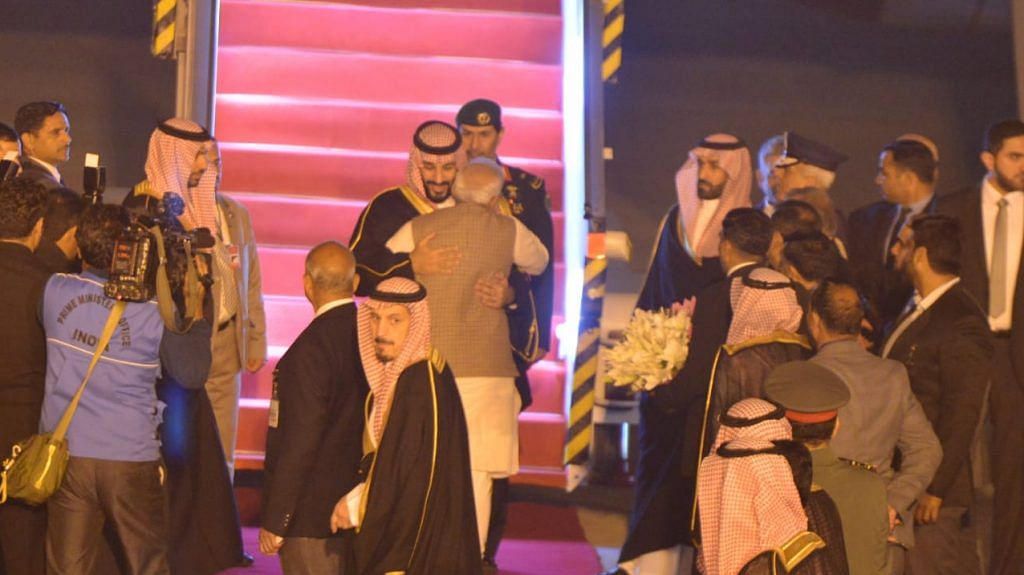We all know that Narendra Modi likes to hug his foreign guests. He has wrapped himself around former US president Barack Obama as well as his successor Donald Trump, he has warmly embraced Portuguese prime minister Antonio Costa, he has looked deeply into the eyes of Russian president Vladimir Putin after a bearhug, he has entwined himself in the thobe of Abu Dhabi crown prince Sheikh Mohamed bin Zayed Al Nayhan and he has greeted Israeli prime minister Benjamin Netanyahu like a long lost soulmate.
Encircle. Enfold. Clinch. Clasp.
The PM’s aggressive self-confidence has been on view for the last five years. He has rarely embraced an Indian Muslim at home, and was criticised for not wearing a skullcap offered by his Muslim constituents when he was the Gujarat chief minister.
However, when it comes to meeting and greeting global personalities, Prime Minister Modi has been secular with his public display of affection. Irrespective of religion, colour and nationality, he has hugged the world’s big people, including Mark Zuckerberg. Naturally, he draws the line with women leaders like Angela Merkel, restricting himself to a prim handshake.
Also read: Hold the outrage over Modi hugging MBS, check these facts first
So what’s the hue and cry about Modi ji hugging the Saudi crown prince Mohammed bin Salman during his just-concluded trip to India? Just because The Washington Post writes that MBS, as the Saudi inheritor to the House of Saud is called, is closely linked to the murder of Saudi journalist Jamal Khashoggi, should no one should touch him with a barge pole?
First of all, this is sheer hypocrisy. During the Cold War and after, the US has routinely made friends and tried to influence dictators, authoritarian leaders and demagogues, all in the single-minded pursuit of its national interest.
Despite his repressive regime, Indonesian president Suharto (1967-1998) was wined and dined by Ronald Reagan because he was a bulwark against creeping Communism. Obama and Hosni Mubarak of Egypt had a polite conversation; Obama ordered lifting the ban on the sale of F-16 fighter jets, tank kits and Harpoon missiles in 2015 to Egypt’s strongman Abdel Fattah-el Sisi.
Also read: Insertion of the ‘P’ word delayed India-Saudi Arabia joint statement
Indian prime ministers have learnt the ropes well. Indira Gandhi was a master of the craft, dazzling Reagan and the rest of America during her trip in 1982; remember that only 11 years before, on the eve of the 1971 war with Pakistan, US president Richard Nixon didn’t hesitate in calling Mrs Gandhi a “bitch”.
In the documents unclassified in 2005, Nixon and former secretary of state Henry Kissinger’s unprintable conversation is peppered with bad words because Indira Gandhi was standing in the way of Pakistan massacring their East Pakistani brethren.
In the recent past in India, though, it has become fashionably self-righteous to use the human rights prism with foreign policy.
When then-foreign minister I.K. Gujral travelled to Iraq and hugged Saddam Hussein, he was roundly criticised, even though it paved the way for the biggest air evacuation in diplomatic history. Then there was Jaswant Singh, who in 1999, suffered some ignominy because he took three terrorists, including Masood Azhar, to Kandahar in exchange for nearly 180 hijacked passengers of IC-814 – and, in the bargain, was photographed holding the hand of Taliban foreign minister Wakil Ahmed Muttawakil. Even prime minister Manmohan Singh, in 2008, was trolled when he told US president George W. Bush that “India loves you” – hours after India and the US agreed to take the pathbreaking nuclear deal forward.
Modi’s hug with MBS is in the same vein. In the wake of the Pulwama attack, Delhi’s need for Arab support is even greater because of the special relationship between Pakistan and the Islamic ummah, and nothing symbolises this as much as the ‘blood tie’ between Saudi Arabia and Pakistan. Even the China-Pakistan “all-weather relationship” comes a close second.
Look at it like this. Since the House of Saud believes it is the Custodian of the Two Mosques, in Mecca and Medina, Pakistan with its nuclear weapons believes it is the protector of that Custodian. It is no coincidence that Pakistan’s former army chief Raheel Sharif now heads the 41-nation Islamic military coalition based in Riyadh.
One of Modi’s key foreign policy prongs in the last five years has been to improve relations with the Arab world, especially UAE and Saudi Arabia – remember it was these countries, along with Pakistan, that were the only ones to recognise the Taliban government in Afghanistan in the 1990s.
In the wake of the Pulwama attack, it was especially important to woo the Saudis. To expect MBS or any other Saudi leader to publicly criticise the Pakistanis is to head towards a fool’s paradise. But to persuade MBS to see India’s point of view and tell him to privately persuade the Pakistan establishment – which MBS also funds – to end its addiction of using terrorists as instruments of leverage was Modi and India’s primary motive.
If this meant that Modi should go to the airport and give him a big, warm hug, then more power to the PM.
Also read: Saudi Arabia’s Crown Prince Mohammed bin Salman could play statesman
Actually, we should encourage this hugging diplomacy. In exchange for his support on Pulwama, MBS would have definitely told Modi that he should hold off on any cross-LoC raids or not try and take out any Pakistani terrorists from the headquarters of the Jaish-e-Mohammed in Bahawalpur, Israeli-style. After all, MBS would not want his beloved Pakistan to suffer any more casualties if he can help it.
Does this mean that the chances of tit-for-tat conflict between India and Pakistan have suddenly reduced after MBS’ visit?
Watch this space for more.
